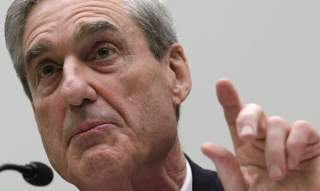The Battle Over the Mueller Report is Just Starting
As Robert Mueller sends his report to Congress, Washington braces for the fallout—or the lack thereof.
Now that special counsel Robert Mueller has delivered his report, the most significant since Watergate and one that is certain to have a real impact on the 2020 election, it is attorney general William P. Barr who is on the hot seat. Barr will make the decision about how much of the report to release and House Democrats are already preparing to demand not only the document itself, but also Mueller’s investigative materials. He told lawmakers in a letter, “I may be in a position to advise you of the special counsel’s principal conclusions as soon as this weekend.”
Will the report represent the beginning of the end of the Trump presidency by uncovering witting collusion with Russia during the election campaign on the part of Trump and his aides? Or it will turn out to be a damp squib that inflicts no real damage on him?
The fact that Mueller is recommending no further indictments will come as a huge relief to Trump and his family. Speculation that Jared Kushner or Donald Trump, Jr., would be indicted was rife. It turned out to be wrong. It is not beyond the realm of possibility that Trump will embrace the report, while Democrats attack it.
The absence of further indictments will provide fresh ammunition for Trump to target his adversaries. All along Trump has contended that he is a victim in the Russia inquiry. Trump made his displeasure with his first attorney general Jeff Sessions manifest on numerous occasions, including publicly mocking his southern accent. To Trump’s disbelief, it was Sessions who recused himself from the Russia inquiry and thereby empowered deputy attorney general Rod Rosenstein to appoint a special counsel in May 2017. Trump raged regularly not only against Sessions and Rosenstein, but also against Mueller himself, suggesting that all were members of a deep state that wanted to undo his election in 2016. With metronomic regularity, Trump has made statements such as “There was no collusion. There was no obstruction. There was no nothing.”
The investigation has resulted in a number of indictments and convictions, including Trump’s past campaign chairman Paul Manafort and his former national security adviser Michael Flynn. In the past week, however, Trump has both attacked Mueller, claiming that he wrote a report “out of the blue,” and begun to make more conciliatory noises, suggesting that he wants the public to see the full report: “Let people see it.” The House has already voted to make the report public. Trump will reportedly devote this weekend to huddling with his advisers at Mar-a-Lago to strategize about responding to the actual report. “We were just waiting, Rudolph Giuliani said this past month. “There’s nothing more we can do.”
Richard M. Nixon was unable to survive Watergate because there was an actual crime—a break-in of Democratic National headquarters—perpetrated at the Watergate by his associates. In the case of Trump, investigators have proceeded backward to uncover if a crime actually took place or not. This has prompted Trump defenders to contend that the investigation is nothing more than a judicial star chamber. Today, Sen. Charles Grassley tweeted, “But throughout this prolonged investigation, which cost tens of millions in taxpayer dollars and included aggressive surveillance tools, we still haven’t seen any evidence of collusion.”
In contrast, Trump’s detractors see something else—a concerted effort to bury any evidence about collusion that might lead to Trump, including the dangling of pardons to help prompt witnesses to think twice before spilling the beans.
It remains an open question whether the Mueller report will convince either side. The next battlefront over the Trump presidency is already starting to take shape in Congress, where House Democrats have launched multifarious investigations of Trump and his cohort that are aimed at exhuming his financial records and dealings as well as examining his decades-long ties to Russia.
As for Mueller, the way he dispatched the report to the Justice Department was consistent with his self-effacing deportment. He held no press conference. Mueller may wish to fade into the woodwork, but lawmakers are calling for him to testify to Congress. “I urge Mr. Mueller to testify before Congress,” said Sen. Jack Reed today, “about the evidence he gathered, the scope of his work, and findings.” The battle over the Mueller report has not ended. It may just be getting started.
Jacob Heilbrunn is editor of the National Interest.
Image: Reuters.

